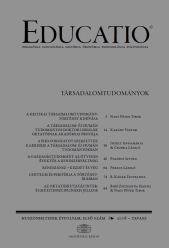Tanulóközösségek és társadalmi innovációk
Learning Communities and Social Innovations
Author(s): Tamás KozmaSubject(s): Education, Human Resources in Economy
Published by: Akadémiai Kiadó
Keywords: learning community; social innovation; lifelong learning; Hungarian education; Central and Eastern Europe
Summary/Abstract: Social innovation as a reinvented concept is widely used and seriously contested (Bradford; Phills–Deiglmeier–Miller 2008; Pol–Ville 2009; Mulgan et al. 2007; Nicholls–Murdock 2012; etc.) Following Ferguson (2017), the author interprets the concept social innovation as a product of the social networks which time to time has to be stabilized by organisations and has to be liberated from them. Social networks are in the process of globalisation, but at the same time they continuously separate from each other. Recent case studies in Hungary found horizontally growing networks that are vertically separated. This construction of networks helps the communities to resist top-down changes and makes them resilient against outside challenges. At the same time vertically separated networks make impossible for social innovations to break through and spread in space and time. The key question of managing social innovation is therefore to connect vertically separated networks while securing their autonomy and ability to resist and being resilience
Journal: Educatio
- Issue Year: 27/2018
- Issue No: 2
- Page Range: 237-246
- Page Count: 10
- Language: Hungarian

